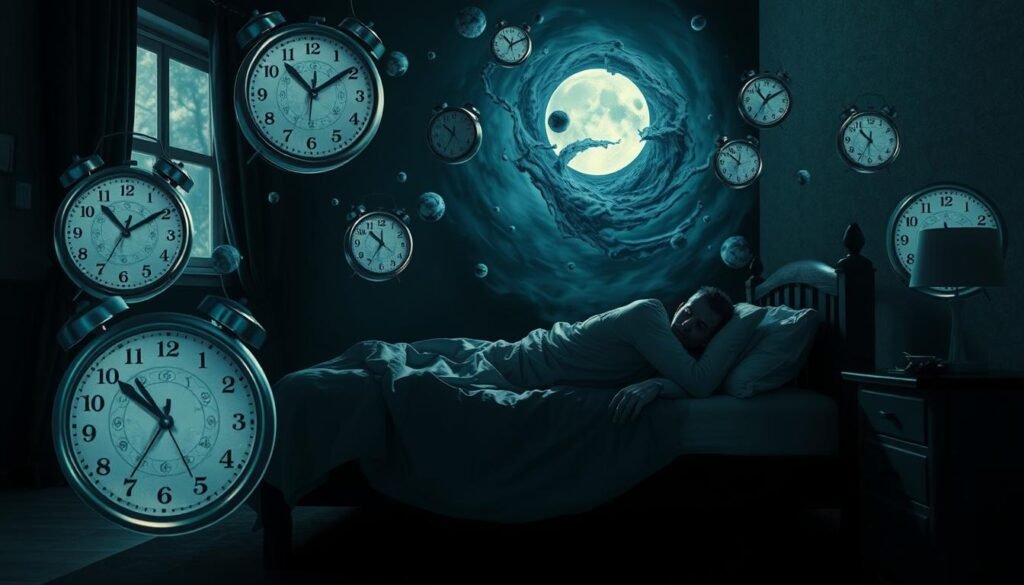About half of American adults have had insomnia at some point. This sleep issue shows up in many ways, like transient insomnia. It can last from one night to several weeks. We’ll dive into what transient insomnia is, including its symptoms, causes, and how to handle it.
Learning about the different insomnia types helps us know more about transient insomnia. We’ll also look at typical symptoms that come with it. This way, we understand the sleep challenges it brings.
If you’re curious about how transient and chronic insomnia differ, check out this handy guide. It provides a clear comparison.
Key Takeaways
- Transient insomnia is temporary, lasting from one night to a few weeks.
- It’s not the same as chronic insomnia, which happens three nights a week for three months or more.
- Knowing insomnia symptoms is key to managing it well.
- Stress, changes in your life, or your environment can cause transient insomnia.
- Good sleep habits can help keep transient insomnia at bay.
Understanding Sleep and Insomnia
Sleep is key to staying healthy. Adults need 7 to 9 hours of sleep each night. Not sleeping enough can cause health problems, mood swings, and trouble at work or school. Insomnia overview shows that it’s hard for people with insomnia to fall or stay asleep. There are different types like short-lived and long-lasting insomnia.
Short-term insomnia can last 2 to 4 weeks and many adults face it. It’s often due to stress or changes around us. Long-term insomnia goes on for three months or more. It’s more common in older people and women. Proper sleep is essential for our bodies and minds to heal and stay healthy.
Insomnia makes you wake up often, struggle to fall asleep, and feel tired in the day. It can be caused by mental health issues or bad sleep habits. It’s important to deal with insomnia to avoid more health problems later.
To learn more about insomnia and how to deal with it, check out this comprehensive resource.
What Is Transient Insomnia
Transient insomnia is a short-term sleep problem. It’s known for its brief duration. Transient insomnia definition means the condition lasts from a few nights to a couple of weeks. It usually gets better when the cause is fixed.
Definition and Duration
Duration of transient insomnia is less than three months. This makes it very different from chronic insomnia. Chronic insomnia happens at least three nights a week for more than three months. People with transient insomnia often have their sleep messed up by stress, bad events, or short-term health issues. These sleep problems are serious, but they often go away quickly after the cause is dealt with.
Comparison to Other Insomnia Types
Knowing the different kinds of sleep disruptions is important. Transient insomnia is not the same as acute insomnia or chronic insomnia. Acute insomnia is short but severe. Chronic insomnia is when sleep troubles last a long time. There’s also intermittent insomnia, which is off-and-on sleep issues between normal sleep times. It’s key to know your symptoms well. This helps in finding the best way to treat your sleep issues.

Symptoms of Transient Insomnia
People with transient insomnia often have trouble sleeping. Knowing these signs helps tackle sleep problems.
Trouble Falling Asleep
Many find it hard to fall asleep. They stay awake for a long time before sleeping. This causes frustration as they seek rest. Sleep initiation issues prevent a smooth transition to sleep. This affects mental and emotional health.
Restlessness During Sleep
Others wake up often during the night. This sleep disturbance keeps them from deep sleep. Waking up and not being able to go back to sleep makes them tired.
Feeling Unrefreshed Upon Waking
Waking up tired is another sign of transient insomnia. People feel exhausted in the morning. This impacts their day and makes them feel worried about sleep.

| Symptom | Description |
|---|---|
| Trouble Falling Asleep | Difficulty initiating sleep, lying awake for long periods. |
| Restlessness During Sleep | Frequent awakenings and trouble returning to sleep. |
| Feeling Unrefreshed Upon Waking | Awake but feeling fatigue, despite enough sleep time. |
Causes of Transient Insomnia
Knowing why transient insomnia happens helps people figure out their sleep issues. Things like certain triggers, stress, worry, and where you sleep all play a big part. They cause this short-term sleep problem.
Common Triggers
Transient insomnia usually happens because of clear triggers that stop you from sleeping well. Among these are:
- Big life changes, like getting a new job or moving
- Shocking events that upset you deeply
- Getting sick, which makes you uncomfortable
The Role of Stress and Anxiety
Stress is a big reason for transient insomnia. It can come from hard situations at work, troubles with those we care about, or money issues. Anxiety often comes with it, making each other worse. Stressful things to think about include:
- Worrying about losing your job or not doing well
- Problems in relationships or going through a divorce
- Being anxious about health, which keeps your mind busy
Environmental Factors
Where you sleep can also cause insomnia. A bad sleeping place makes it hard to rest. Problems often seen are:
- Loud noises, like cars or loud neighbors
- Being uncomfortable because your bed or room isn’t right
- Jet lag from traveling through time zones, messing up your sleep cycle

Understanding all these causes helps in fixing sleep problems. When you tackle these issues quickly, you sleep better. This improves your life and health.
Transient Insomnia vs Chronic Insomnia
Insomnia comes in different forms, each affecting people in unique ways. Understanding transient and chronic insomnia helps identify their impacts.
Defining Characteristics
Transient insomnia lasts a short while, from a few nights to weeks. It’s often due to stress, life changes, or environment. On the other hand, people with chronic insomnia struggle to sleep or stay asleep for at least three nights a week over three months or more. This long-term issue usually relates to health or mental problems, affecting well-being deeply.
Impact on Daily Life
The effect of insomnia varies with its type. Short-term episodes lead to minor issues like fatigue or irritability.
But chronic insomnia can disrupt life more severely, impacting work, social life, and mental health. Sufferers may face trouble focusing, mood shifts, and overall mental decline.
Understanding insomnia’s significant effects shows why it’s crucial to deal with sleep problems quickly. Effective solutions can greatly enhance daily life and well-being.
| Type of Insomnia | Duration | Trigger Factors | Impact on Daily Life |
|---|---|---|---|
| Transient Insomnia | Days to weeks | Stress, life changes | Mild but temporary disturbances |
| Chronic Insomnia | Three months or longer | Medical, psychological conditions | Significant, ongoing daily disturbances |
For deeper insights into insomnia types and their effects, consider exploring this resource.
Diagnosis of Transient Insomnia
To diagnose insomnia, a deep look into symptoms and sleep history is needed. Doctors start by asking about sleep patterns and possible reasons for poor sleep. They check how long sleep issues have been happening and if life changes or stress link to the problems.
Identifying Symptoms and History
People share their sleep struggles with doctors. They talk about trouble falling asleep, staying asleep, or waking too early. The doctor checks how long these issues last, using guidelines like the DSM-IV or DSM-5.
Insomnia is when sleep problems last for at least a month, says DSM-IV. DSM-5 says three months. Both say the sleep trouble must seriously affect life.
Consultations with Healthcare Providers
Talking to a doctor is key if you think you might have insomnia. A detailed sleep check might include keeping a sleep diary. This tracks sleep, caffeine use, and what might disturb sleep.
This info helps doctors understand sleep issues better. With this, they can figure out if it’s transient insomnia. Then, they can suggest ways or treatments to help improve sleep.
Treatment for Transient Insomnia
Those with transient insomnia often look for treatments to sleep well again. There are many choices, from behaviors to take up to medicines. It’s vital to know these options to choose wisely for your sleep.
Behavioral Techniques
Good sleep hygiene is key in tackling transient insomnia. By keeping a regular sleep time, learning to relax, and cutting back on naps, sleep improves. These steps help fix our natural sleep patterns, calm stress, and prepare us for good sleep. Adding exercises and practices like yoga or meditation boosts sleep quality and health.
Medication Options
At times, medicine might be needed for transient insomnia. For short periods, certain prescriptions can help, such as:
| Medication | Indication |
|---|---|
| Eszopiclone (Lunesta) | Trouble falling and staying asleep |
| Ramelteon (Rozerem) | Trouble falling asleep |
| Temazepam (Restoril) | Trouble falling and staying asleep |
| Zolpidem tartrate (Ambien, Ambien CR, Edluar) | Trouble falling and staying asleep |
| Doxepin hydrochloride (Silenor) | Trouble staying asleep |
| Suvorexant (Belsomra) | Trouble falling and staying asleep |
Doctors usually urge careful use of these pills due to possible side effects and the risk of dependence. The aim is to balance behavior changes and medication for best results. Always talk to a doctor before starting any new medication to be safe and effective.
Prevention of Transient Insomnia
To prevent transient insomnia, start with healthy sleep habits. Aim for a regular sleep schedule to balance your body’s clock. This boosts sleep quality. A comfy sleep space is key as well. Ensure it’s cool, dark, and quiet to improve restfulness.
Adding mindfulness like meditation helps reduce stress before bed. It makes it easier to relax after a long day.
Establishing Healthy Sleep Habits
Adopting good sleep habits benefits overall health and fights insomnia. Daytime exercise can lower stress and anxiety. These often disturb sleep.
Avoiding caffeine and alcohol helps maintain steady sleep patterns. A relaxing bedtime routine signals your body it’s time to rest. This environment supports deep, restful sleep.
Managing Stress Levels
Keeping stress low is vital for avoiding transient insomnia. Activities, mindfulness, and staying connected help lower stress. This can reduce insomnia incidents.
By tackling stress, you can improve sleep quality. Adopting these habits prevents insomnia and promotes a healthier life. For more details on insomnia, visit symptoms and causes of insomnia.